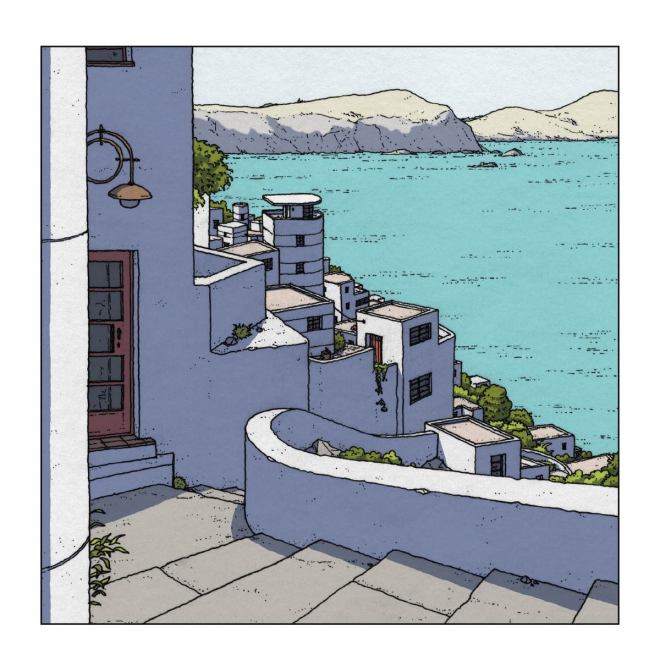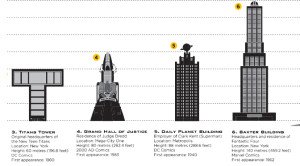Owen D. Pomery
Avery Hill Publishing, 2020
Is this slow world-building or a plodding narrative? Quiet and profound, Victory Point is a very different comic book to the last comic by Owen Pomery which we reviewed – https://worldcomicbookreview.com/2020/06/29/british-ice-review/ British Ice was a violent horror story ready-made for an indie motion picture release. Victory Point is quite the opposite. It pleasantly meanders, is at times distracted, and features explorations of familiar themes such as loss and being lost.
The main character, Ellen, arrives in her hometown for a “fleeting visit” with her father. Victory Point is a unique place. It is described as having been built as a liberal social utopian experiment. The architecture is retro-futuristic, and so the town is a destination for design students. The social engineering was pronounced and went beyond just the style of the buildings – the demography was deliberately established as multicultural. The most prominent feature of the town, a observatory, both picks out light from far away, and yet is a symbolic beacon of knowledge.
Ellen’s deceased mother is an astronomer, that profession which is close to a science fiction career in the 1950s. And the name of the town, Victory Point, initially suggests some sort of quintessentially English commemoration of a forgotten Great Game battle, but instead seems to note the triumph of liberalism (Mr Pomery notes at one point that it actually does not matter). There is a very substantive volume of world-building in this relatively short comic. We suspect that the world-building, the unlikely history of the town, is a retrospective plot addition to explain the nature of Mr Pomery’s art.
The landscape art is sublime. Mr Pomery’s highly detailed drawings of Victory Point and its surrounds are plainly the work of hours of concentration and skill.

Victory Point is a place where we would love to get lost. At first, we mistakenly categorised Mr Pomery’s art on this title as ligne clare, but five pages in we recognised it as the same sort of immersive landscape realism of Osamu Masuyama – Mr Pomery draws heavily upon the ethos of Hayao Miyazaki and his Studio Ghibli collaborators. Small minutiae, like Ellen standing at the promontory smelling the sea air, and the awkward fumbling about in a bucket outside a shop looking for a swimsuit, all add to the sense of realism.
Mr Pomery sometimes leans into text, contained in blank white pages, to explain some of the background of the town. We initially wondered if this was necessary, and whether it is a device occasioned by the brevity of the comic. Narrative text is normally lazy writing: Instead of allowing the reader to work out the context of a story through the actions of the characters, telling the reader is a cumbersome method of storytelling. In this instance, none of Mr Pomery’s use of those pages of text is fundamental in furthering the message of the comic. On a re-reading, the text is suggestive of an architectural guide or educational textbook regarding the history of Victory Point (such a book is seen on sale at the end of the comic in Ellen’s bookshop). In any event, in so far as this is a criticism, it is a small one.
The characters come in twos. We have Rob, an old friend who runs the local garage, and Gemma, who runs a local shop called, amusingly, “Station Shop” (which together with “Hilltop Tavern” seems to reflect some sort of 1950s descriptive “blanding” brand development). Both characters have settled down (we briefly meet Rob’s wife) in the town, and are content with their respective lots. Gemma has two kids, and jokes about how she has climbed the corporate ladder and now manages the small shop. Ellen finds these interactions awkward. They are a backwards step for Ellen into an embarrassingly small town, the sort of people who chose never to have experiences beyond their comfort zone. Unlike Ellen, they have not sought out a big city career, working for a multinational book vendor in London. Yet, they both seem happier than Ellen, for neither of them are lost.

Next, we have Ellen’s father, and the anonymous sage owner of Caffe Cardinalle. Both are granted the more thoughtful dialogue. “Please don’t drive yourself crazy. There’s a way through, however well hidden the path” and, “Everyone’s experience of everything is compromised by something.” Rob and Gemma threaten to drag Ellen backwards. Ellen’s father and the cafe owner push her forwards. The old town has insights after all.

Finally, we have two characters who are around but silent. Ellen’s mother died in a tragedy, slipping off the balcony edge of the observatory during a storm while trying to save the building. The plaque in her honour is scratched and covered in graffiti. The picture of her mother sitting on Ellen’s father’s wall is taken from a distance. But her mother’s presence is everywhere. Speaking from personal experience, those who are partially orphaned find themselves pushing against the tide with only one oar. On a superficial level, time dilutes the tragedy to the bare and indisputable facts. But, to mix metaphors, the ground is never quite stable under your feet ever again. Ellen goes to the ocean to swim, and scrambles down an eroded and slightly dangerous path which has been blocked to pedestrians. There is something symbolic in the dust and very uncertain footing in Ellen’s life and loss.
And the final character is the ocean. Ellen is rejuvenated by it, breathing in the sea air, swimming naked off a rocky outcrop. Ellen’s mother was taken by an ocean storm. Ellen’s father spends time in his new wooden boat, enjoying the currents and the breeze. We learn it eventually takes him, too. We need to get to page 32 (of 67 pages) before we finally find a double page spread which does not at least have a glimpse of the ocean (and even then it leads on to Ellen’s descent to the beach).
Here is the promotional text for the comic, from the Avery Hill website:
On a summer’s day, Ellen returns to the coastal town she grew up in, the picturesque, yet architecturally strange, Victory Point. Revisiting old haunts and people from her past, she feels increasingly disconnected from her previous life, and exhausted by the constant struggle of trying to forge the path ahead. Exploring a town, which itself is an experiment in how to live, Ellen searches for some comfort in her own history that might just give her the strength to move forward. Victory Point quietly explores the idea of how we choose to live and be remembered. Asking whether we should strive for a higher calling, or if a simple, domestic legacy is the most honest and admirable achievement we can hope for. And if the land from which we disembark feels as alien as the one we hope to reach, how does anyone make their peace with a life amongst the ever-changing ocean waves?
If you are looking for a Christmas gift for your cancel culture teens, you could do much worse. Or, better, if you are in lockdown, use this wonderful comic as a substitute summer holiday.

